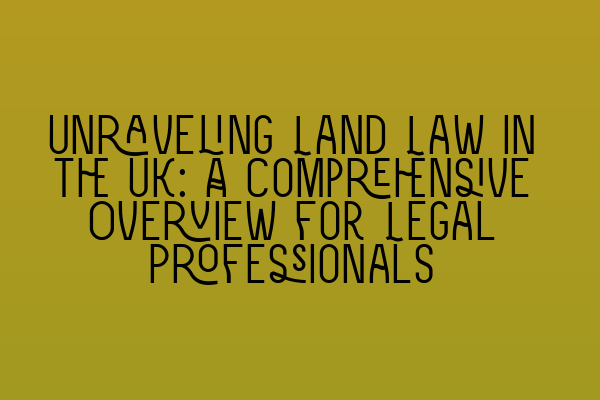Unraveling Land Law in the UK: A Comprehensive Overview for Legal Professionals
Introduction
Land law in the UK is a complex and ever-evolving field that requires a thorough understanding of both legislation and case law. As legal professionals, it is crucial to have a comprehensive knowledge of land law to navigate the intricacies of property transactions and disputes. In this blog post, we will delve into the various aspects of land law in the UK, providing an overview that will help you better grasp the subject and enhance your expertise in this area.
1. The Basics of Land Law
To start our journey through land law, let’s begin with the fundamentals. Land law in the UK is primarily governed by the Law of Property Act 1925, which defines the different types of property rights and their corresponding legal protections. This legislation establishes the foundation upon which land and property transactions are conducted.
2. Types of Property Rights
In the UK, property rights can be classified into two main categories: freehold and leasehold. Freehold refers to absolute ownership of land or property, whereas leasehold provides the right to occupy and use the land or property for a specified period, subject to the terms of the lease agreement. Understanding the distinctions between these two types of property rights is essential when dealing with property transactions.
3. Land Registration
The process of land registration is vital to protect property rights and establish legal ownership. The Land Registration Act 2002 provides a framework for registering land and property in the UK. It aims to ensure accuracy, certainty, and transparency in property transactions. Registering land not only safeguards ownership but also simplifies conveyancing processes.
4. Conveyancing
Conveyancing is the legal process of transferring ownership of land or property from one party to another. It involves various steps, including drafting and negotiating contracts, conducting searches, and facilitating the exchange of funds. Conveyancing is a key area of land law where legal professionals play a crucial role in ensuring a smooth and legally sound transfer of property.
5. Easements and Covenants
Easements and covenants are important legal concepts that affect land and property rights. An easement is a right that one party has over another’s land, such as a right of way or a right to access utilities. Covenants, on the other hand, are enforceable promises between parties regarding the use and restrictions of land. Understanding the implications of easements and covenants is essential when dealing with property transactions and disputes.
6. Boundaries and Adverse Possession
Boundary disputes can be a contentious issue in land law. Unclear boundary lines and disagreements between neighboring landowners often give rise to legal disputes. Understanding the principles and legal tests used to determine boundaries is vital in resolving such conflicts. Additionally, adverse possession is another area of land law that deals with the acquisition of land through long-term possession without the owner’s consent. Legal professionals must be knowledgeable in this area to advise clients and protect their interests.
7. Leases and Tenancy
Leases and tenancy agreements are a common aspect of property law. Landlords and tenants enter into agreements that define the rights and obligations of each party. It is essential to understand the legal framework governing leases and tenancy agreements, as well as the rights and remedies available to both landlords and tenants. Additionally, legal professionals must be familiar with the regulations surrounding residential and commercial tenancies, such as the Landlord and Tenant Act 1954 and the Housing Act 1988.
8. Land Disputes and Remedies
Land disputes can arise from various sources, such as disagreements over boundaries, breaches of covenants, or disputes between landlords and tenants. Legal professionals play a critical role in resolving these disputes through negotiation, mediation, or litigation. Understanding the remedies available in land law, such as injunctions, damages, and specific performance, is essential to protect clients’ interests and achieve favorable outcomes.
Conclusion
Land law in the UK is a vast and intricate field that requires a deep understanding of legislation, case law, and the practical application of legal principles. This comprehensive overview has provided legal professionals with a solid foundation in the complexities of land law, giving you the tools to navigate property transactions, resolve disputes, and protect your clients’ interests effectively.
Remember, staying up to date with developments in land law is crucial for maintaining your expertise. Explore the related articles below for additional resources and courses that can further enhance your understanding of land law:
– SQE 1 Practice Exam Questions
– SQE 1 Practice Mocks FLK1 FLK2
– SQE 2 Preparation Courses
– SQE 1 Preparation Courses
– SRA SQE Exam Dates
Continuing your professional development in land law will ensure that you remain at the forefront of this ever-evolving field and provide the best possible service to your clients.
